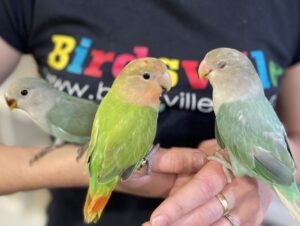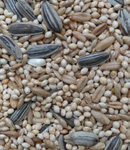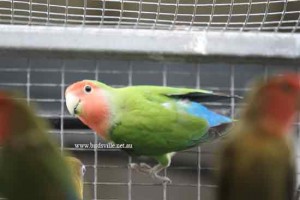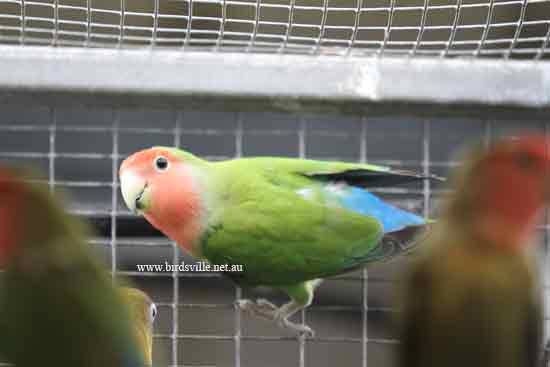Care guide for peach face lovebird’s

check our Facebook and instar for updated photos.
https://www.facebook.com/BirdsvilleRosebery/
Along with our hand raised peachface lovebirds we have bird and cage specials, call us in store or visit. We have Australia’s biggest selection of bird cages, toys, feed, treats, and more.
Availability at birdsville
Available all year round if you are after a tame baby peachface call birdsville and visit us in store to see them for yourself.
Peachface as Pets
When Peachfaces are hand raised they make wonderful pet but can be a bit aggressive sometimes as they will treat you like another love bird when they are hand raised. These little guys develop a strong bond with their new family, when the time and training is put into them. Hand Raised Peachfaces do not need to be purchased as a pair. It is recommended that one bird is purchase, so it will form a strong bond with you and your family, instead of forming a bond with a second bird. Train your bird up for 3 to 4 months before consisting purchasing a second Hand Raised Peachface, this will keep your first bird tame, and the second bird will learn from the first.
Similar to Indian ringnecks these birds can become a little flighty even right after being hand raised do not be alarmed and follow the steps on our training page and your bird will bond up to you very quickly.
Notice the vibrant colors this is because these are fully mature birds. When they are babies they are quite dull in color.
Cage’s for Hand Raised Peach face.
Your new Peach face will need enough room to stretch its wings, for plenty of toy, food/water bowls and perches. When looking for a cage for your Peachface keep all this in mind and buy the largest cage you can afford to make sure your bird remains happy healthy and tame. Staff at birdsville can help you with this selection from our large range of cages in store.
After selecting your birds new cage, the next step is toy’s. Choose toys that they can chew on, climb on with different textures like leather and wood, swings, bells and ladders. Rotating toys are a good idea, so your bird does not get bored with their toys.
Introducing your new bird to existing birds
If you are purchasing a second, Hand Raised Peachface you will need to house it in different cage from your first Peachface for a least two weeks. Place the Two cage next to each other, this allows the bird to adjust to the new environment and both birds to get to know each other without seeing the other one as a threat. After the two weeks introduce the two birds and keep a close eye on them, if they get along all good, if not separate them for another week and repeat the process. Be wary of mixing bird’s together as they can kill each other.
Stress
Add sulfa aid, sulphadim or sulfa 3 to the water for at least the first 5 days of bringing your baby hand raised peach face home and or if your bird is a bit stressed and has diarrhea. This is seed as water droppings this can happen to a stressed bird especially baby birds and is easily fixed with this mild anti biotic which will stop the bird from losing too much moisture and becoming a more serious problem.
Worming
It is very important that you worm your Peachface. It will need to be done in a few weeks to two months after being taken home (check with the staff from Birdsville, when purchasing). When the bird is at the shop, they have been recently weaned have a delicate bacteria’s developing in their gut. This makes them to young for worming, if we did worm at this stage could harm the bacteria’s development and your new bird. This is why we recommend a certain waiting before your worm your bird.
Worming will need to be repeated every 6 months. Worming your bird is essential for the health of all parrots in captivity.
Lice & Mites
If you find your bird is scratching more than usually, it is one of two most common parasites, lice or mite. This is easily controlled with a Mite and Lice spray, available at Birdsville.
Training peach face lovebird’s
Training your peachface is much like training a budgie. Handle your bird in a quiet, relaxed situation, best time is while you’re watching TV or reading, but don’t over stress your bird in the first few weeks of taking it home babies need rest. The more time you spend with your bird, the better your bird will become.
Baby parrot’s do not have the confidence of adult bird’s to get your baby peach face to be like this one take time and patience.
Enrichment and toys for your peach face
Enrichment can be chewing toys, play toys, leather toys, acrylic plastic toys, wooden toys, shredding toys, ropes, swings, ladders, bells, balls, birdie balls, plain cardboard, small boxes, wicker baskets, tray of wheat grass, plants, bird baths, different foods, food kabobs and nuts, all available at birdsville.
Enrichment tip- the trick to keeping them entertained is regularly rotating toys as they will become bored with the same toy in their cage day after day. Changing them regularly will create interest for your bird as if they are receiving a whole new toy to play with.
Diet for Peach Face Lovebirds
Seed– Feeding peach face lovebirds require a good quality seed mix which is important for their health and vitality. Be wary of the seed as some fancy packaged seed brands the box actually is worth more than the seed as they have filler seed and granules which is poor quality which the birds do not eat and are weighed down with shell grit. Shell grit should be supplied in a separate container to the seed as it is heavy and sinks to the bottom of the seed. Be sure to ensure your bird is getting good quality seed the bird will know!
Birdsville blend Tiel and lovebird – This is the creme de la creme of great foods and is our most popular item as we manufacture it fresh in store with legumes, herbs, grains and superfoods including dried beetroot and other vegetables.
The good oil – Available in store packed with Liquid Omega 3 and 6 supplement for not only improving the health of Peachface lovebirds in general and their eggs it can help with fatty liver disease. Omega 3 and 6 can be deficient in many grains and this can help repair the liver, egg production and immunity. The good oil also contains fat – soluble vitamins including A, D3 and E. Easy to use mix 15ml of the good oil per kg of seed. Let mix stand for at least 4 hours at room temperature before feeding to ensure the oil leaks into the kernel of the seed.
Sprouted seed– a great way to increase greens in your peachies diet, and full of nutrition.
Millet sprays– a fresh millet still on the stem we recommend French white as the best millet spray of peach face.
Pellets– a wonderful addition to your tame peachfaces diet we feed ours Vetafarm Nutriblend pellets, Vetafarm maintenance pellets, Murphy’s pellets, Pretty bird pellets, and harrisons pellets all of which they absolutely love.
Fruit– apples, rock melon, stone fruit, kiwi, pear, guava to name a few.
Veg and greens– Very important part of their diet feed fresh corn, spinach, broccoli, capsicum, seeding grasses, chick weed, milk thistle, carrot.
Calcium– This can be supplied by simply supplying a cuttlebone or calcium bell. Calcium sticks are good as they also contain iodine as well. Your bird must have a source of unfiltered sunlight to naturally receive vitamin D A window with sum coming through it will filter out the suns ability to deliver vitamin D to your bird.
Vitamin d supplement– Added Via the water supply a number of vitamin D additives available at birdsville.
Vitamin supplement– Added via the water supply not in the seed as they shell the seeds and will not consume the vitamins. No need to feed your birds vitamins if you also give your birds pellets as they already are vitamin enriched.
Fresh water– available at all times.
The Wild Vet
1300 9453 83822A Bridge Road, Glebe Carlingford
Animal Hospital
02 9871 6036
772 Pennant Hills Road Carlingford
SASH
Small Animal Specialist
Hospital 02 (9190 6806)
Level 1, 1 Richardson place North Ryde
02 9436 4884
57-63 Herbert St Artarmon
995 Bourke Street waterloo Sydney NSW 2017


